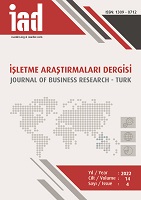Applications and Implications of Service Robots in Hospitality Sector: A Case Study
Applications and Implications of Service Robots in Hospitality Sector: A Case Study
Author(s): Demet Bağıran Özşeker, Erdem Aktaş, Osman Avşar KurgunSubject(s): Social Informatics, Marketing / Advertising, Tourism, Socio-Economic Research
Published by: İşletme Araştırmaları Dergisi
Keywords: Service Robots; Service Encounter; Robotization; Hospitality Management;
Summary/Abstract: Purpose – Previous research has emphasized that service robots cause radically change current service production and delivery practices and, consequently, service management and marketing strategies. This research explores the use of current state-of-the-art service robotics in the hospitality industry and aims to better understand how this technology can transform service operations. Design/Methodology/Approach – An exploratory qualitative approach was adopted for this study. Case study pattern and holistic single case pattern were preferred from qualitative research patterns as the method of inquiry. This qualitative study was conducted using a thematic analysis approach. The criterion sampling method was performed to collect data with one participant through in-depth, semi-structured individual interview. Data were analyzed using a thematic approach that built on a priori themes or categories were adopted for data analysis. Findings – Analysis of participant’s perspectives and experiences showed the 8 themes of the roles of service robotics in service encounters including substitute, support, supporting new business models, improve, differentiate, creative experiences & competition, upskill, and data collection. Unlike the previous research, supporting new business models, creative experiences & competition, and data collection were also found as new technology roles specific to service robots. By developing a new conceptual DRiTE Model (Development of Robotics in Tourism Ecosystem), the research not only contributes theoretical implications to the literature but also offers business strategies (management, marketing, etc.) for hospitality firms to manage innovative, automated service offerings. Discussion – Despite previous research having extensively discussed the use of technology in services, it can be interpreted that the current global tourism industry on the use of robotics in service encounters is still in its infancy. Over time, these micro-scale changes will evolve to form a global ecosystem. This means that the way they do business will change on a global scale through various diffusion areas such as brand, service type or stakeholder network. The paper’s novelty and uniqueness lie in suggesting a new conceptual DRiTE of addressing the implications of this research and offering insight for hospitality services-related managers into how to effectively research implications can be implemented.
Journal: İşletme Araştırmaları Dergisi
- Issue Year: 14/2022
- Issue No: 4
- Page Range: 3081-3104
- Page Count: 24
- Language: English

